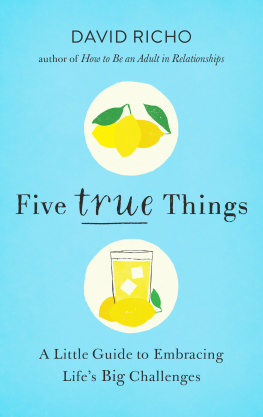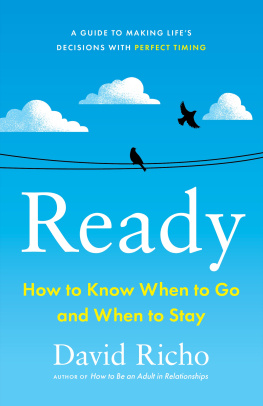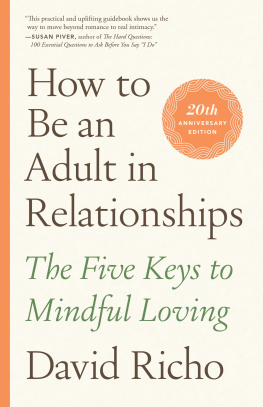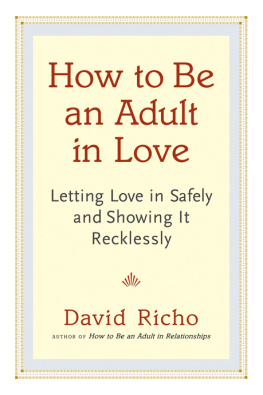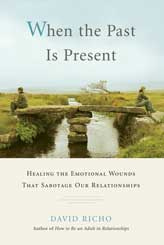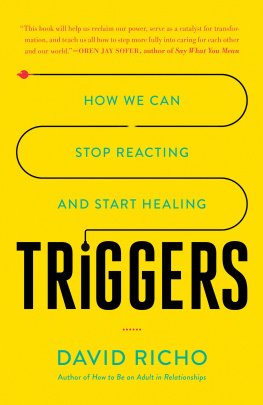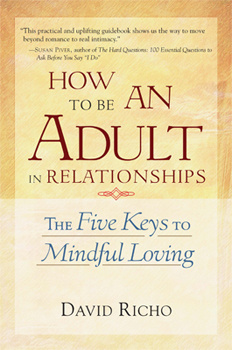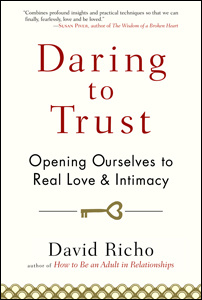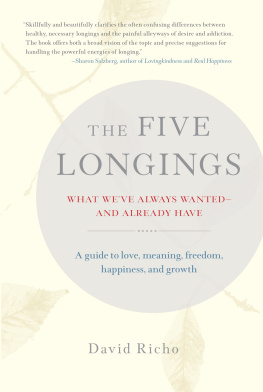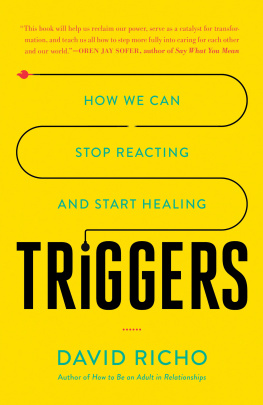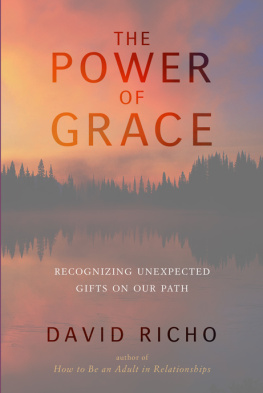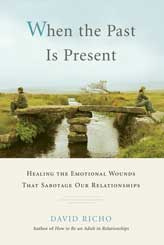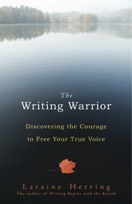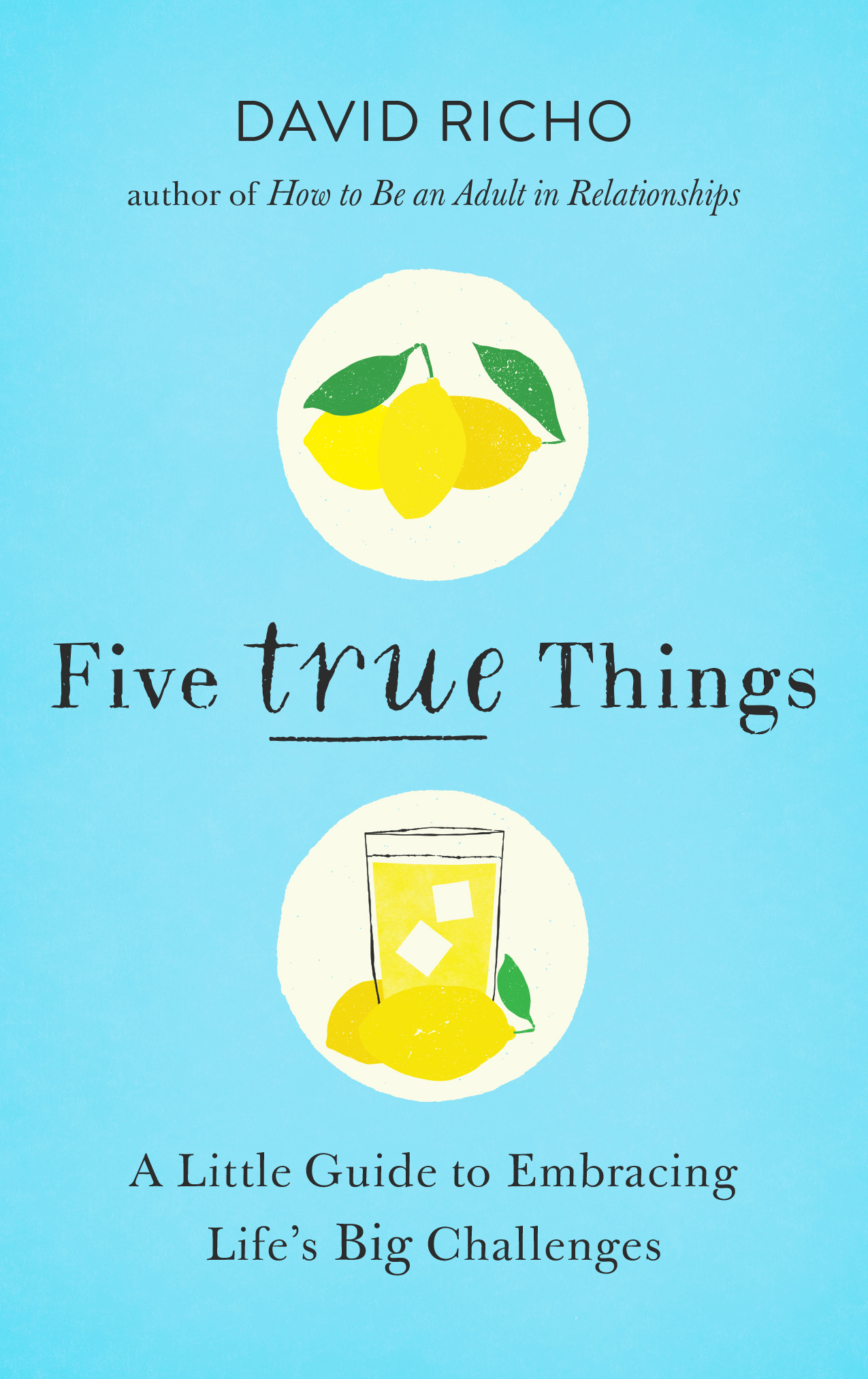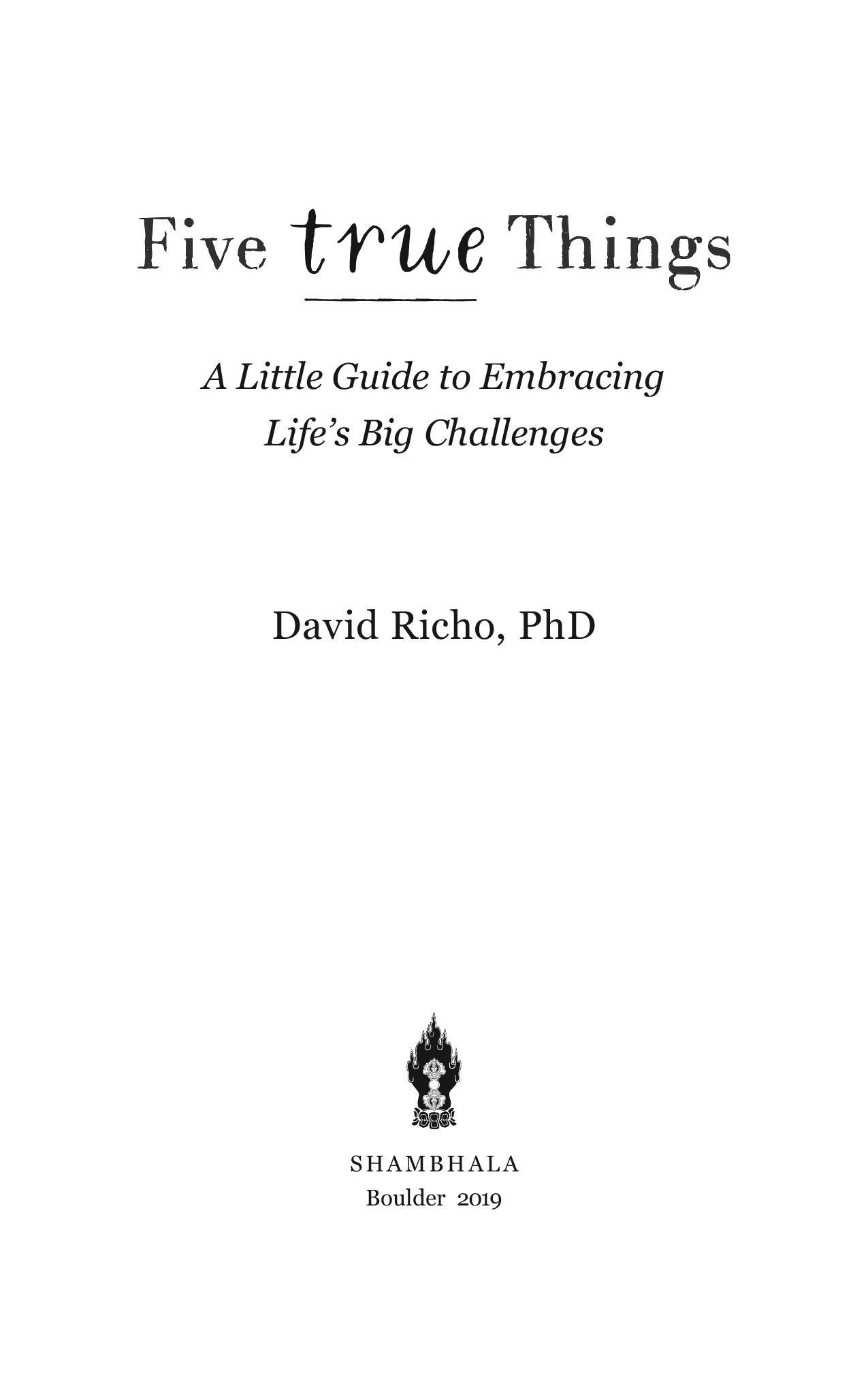Contents
Landmarks
Print Page List
Shambhala Publications, Inc.
4720 Walnut Street
Boulder, Colorado 80301
www.shambhala.com
2005, 2019 by David Richo
This book is an abridged and revised edition of The Five Things We Cannot Change (Shambhala, 2005).
All rights reserved. No part of this book may be reproduced in any form or by any means, electronic or mechanical, including photocopying, recording, or by any information storage and retrieval system, without permission in writing from the publisher.
Cover art by Elen Koss/Shutterstock
Cover design by Daniel Urban-Brow
L IBRARY OF C ONGRESS C ATALOGING - IN -P UBLICATION D ATA
Names: Richo, David, 1940 author.
Title: Five true things: a little guide to embracing lifes big challenges / David Richo, PhD.
Other titles: How to be an adult in love.
Description: Boulder, Colorado: Shambhala, [2019] | Abridged and revised edition of The Five Things We Cannot Change, 2005.
Identifiers: LCCN 2018022086 | ISBN 9781611806670 (pbk.: alk. paper)
eISBN 9780834842045
Subjects: LCSH: Love. | Interpersonal relations. | LoveReligious aspectsBuddhism. | Interpersonal relationsReligious aspectsBuddhism.
Classification: LCC BF575.L8 R53 2019 | DDC 152.4/1dc23
LC record available at https://lccn.loc.gov/2018022086
v5.4
a
For my grandson Nathaniel, age two,
with a welcoming yes
to all that you are and will be
in the Sacred Heart of our world
CONTENTS
INTRODUCTION
There are some things in life over which we have no control, probably most things. We discover in the course of our lives that reality refuses to bow to our commands. Another force, sometimes with a sense of humor, usually comes into play with different plans. We are forced to let go when we want so much to hold on, and to hold on when we want so much to let go. Our livesall our livesinclude unexpected twists, unwanted endings, and challenges of every puzzling kind.
Reinhold Niebuhr, an American Protestant theologian, composed a prayer in 1943 that has become the cornerstone of the recovery movement: God grant me the serenity to accept the things I cannot change, the courage to change the things I can, and the wisdom to know the difference. This is a profound aspiration. But what are the things we cannot change? Are they unique to each of us, or are there some things that all of us must acknowledge and accept in order to find peace in our lives?
As a psychotherapist working with clientsand in my own lifeI have seen the same questions and struggles arise again and again. There are five unavoidable givens, five immutable facts, what we mean by true things, that come to visit all of us many times over:
Everything changes and ends.
Things do not always go according to plan.
Life is not always fair.
Pain is part of life.
People are not loving and loyal all the time.
These are the core challenges that we all face. But too often we live in denial of these facts. We behave as if somehow these givens arent always in effect, or not applicable to all of us. But when we oppose these five basic truths we resist reality, and life then becomes an endless series of disappointments, frustrations, and sorrows.
In this book, I propose the somewhat radical idea that the five givens are not actually the bad news that they appear to be. In reality, our fear of and struggle against the givens are the real sources of our troubles. Once we learn to accept and embrace these fundamental, down-to-earth facts, we come to realize that they are exactly what we need to gain courage, compassion, and wisdomin short, to find real happiness.
A given is a fact of life over which we are powerless. It is something we cannot change, something built into the very nature of things. From one point of view, there are many givens. In addition to the five disturbing givens stated above, there are also delightful givens: we experience bliss, our hopes are sometimes exceeded, we discover unique inner gifts, things have a way of working out, luck comes our way, and miracles of healing happen. There are also givens that apply only to us as individuals: our body shape and personality, our unique psychological and spiritual gifts or limitations, our temperament, our genetic makeup, our IQ, our mainstream or peripheral lifestyle, whether we are introverted or extroverted, and so forth.
Some givens call for a yes to engage in action for change, not a yes to accept the status quo in regard to problems such as racism, economic injustice, disregard of human rights, prejudice against women and minorities, environmental devastation. These are indeed present-day givens but they are not built into humanity and nature; they are dark choices. These are the injustices we are here to fight, the ones that can activate our courage to do what it takes to make a difference. Our yes is then a collaborative evolutionary project, that of co-creating a world of justice, peace, and love.
There are, in fact, givens in every thing we do and in every place we enter. A given of having a job is that we might advance or we might be firedas well as any number of possibilities between. A given of a relationship is that it may last a lifetime or it may end with the next phone call.
I have found that anything that crosses swords with our entitled ego is a powerful source of transformation and inner evolution. The five simple facts of life defy and terrorize the mighty ego that insists on full control. Life happens to us in its own way, no matter how much we may protest or seek to dodge it. No one is or has ever been exempt from lifes uncompromising givens. If we cannot tolerate them, we add stress to our lives by fighting a losing game.
In this book I will attempt to show that we need not feel despair in the face of the givens of our lives. We can learn to accept life on its own terms. We can even find its terms satisfactory. We do not have to shake our fist at heaven. We do not have to demand an exemption or take refuge in a belief system that muffles the wallop of the givens by promising a paradise without them. We can craft a sane and authentic life by saying yes to life just as it is.
The story of Buddhas enlightenment illustrates that the givens of life are the basis of our growth and transformation. The Buddha was born Siddhartha Gautama, an Indian prince. His father tried to protect him from encountering pain or displeasure. The king created a life of utter perfection for Siddhartha, providing him every possible satisfaction and shielding him from all unpleasantness. But one day the young prince wanted to see what lay beyond the palace walls. When he ventured out, he soon encountered sickness, old age, and deaththe natural conditions of every lifefor the first time. These sights moved him deeply and set him on a spiritual journey that ultimately led to his enlightenment. His legendary transformation began by facing the laws of life with curiosity and courage.
From ancient times, the five givens have puzzled and chagrined humanity. Religions offer responses to mysteries like these. Throughout this book I will draw on teachings from Buddhism and other world religions. Spiritual traditions offer us valuable resources, models, and inspiration for facing the givens of life openly and with equanimity. The Buddhist tradition in particular emphasizes the importance of seeing through our illusions and facing up to lifes givens. This fidelity to reality is a way to ground ourselves in fearlessness. Throughout this book we look at ways to integrate our psychological work and our spiritual practice, the two pathways to wholeness.

